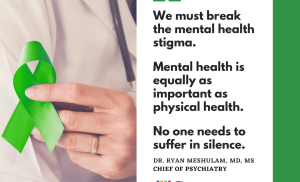How Can We Encourage Open Conversations About Mental Health?
In today’s world, mental health is a topic that deserves more attention and understanding. However, in certain communities or workplaces, discussing mental health can still be met with stigma and judgment. So, how can we create a safe space where open conversations about mental health can flourish, even in these environments? It’s essential to find innovative ways to encourage empathy, education, and support, so that individuals feel empowered to share their experiences and seek the help they need. By fostering an environment of acceptance and understanding, we can pave the way for collective growth and well-being.

Education and Awareness
Providing accurate information about mental health
One of the first steps to encourage open conversations about mental health in stigmatizing communities and workplaces is to provide accurate information about mental health. This includes sharing facts and dispelling common myths and misconceptions surrounding mental health conditions. By offering accurate information, individuals can gain a better understanding of mental health and be more open to discussing it.
Disseminating educational materials
Another effective way to encourage open conversations about mental health is by disseminating educational materials. This can include brochures, pamphlets, and posters that provide information about different mental health conditions, their symptoms, and available treatment options. By making these materials readily available in workplaces and communities, individuals can have easy access to information and resources that can help them understand and support mental health.
Organizing workshops and seminars
Workshops and seminars can play a crucial role in encouraging open conversations about mental health. These events can be specifically designed to educate individuals about various mental health conditions and offer strategies for promoting mental well-being. By organizing engaging and interactive workshops, organizations and communities can create a safe space for individuals to learn, ask questions, and share their experiences regarding mental health.
Offering training programs for employees
To foster open conversations about mental health in the workplace, organizations can offer training programs for employees. These programs can provide comprehensive knowledge about mental health, how to identify signs of mental distress, and how to support colleagues who may be experiencing mental health challenges. By equipping employees with this knowledge and understanding, organizations can create a supportive environment that encourages open dialogue and reduces the stigma surrounding mental health.
Promoting a Supportive Environment
Creating a culture of empathy and understanding
To encourage open conversations about mental health in stigmatizing communities and workplaces, it is essential to create a culture of empathy and understanding. This involves fostering an environment where individuals feel valued, respected, and supported. Organizations and communities can promote empathy by creating opportunities for individuals to share their stories, providing a listening ear, and actively engaging in conversations about mental health without judgment or prejudice.
Establishing support groups
Support groups can offer a safe and confidential space for individuals to share their experiences, seek advice, and receive support. By establishing support groups within workplaces and communities, individuals can connect with others who may be facing similar challenges. These groups can provide a sense of community, reduce feelings of isolation, and encourage open conversations about mental health by promoting understanding and empathy.
Offering confidential resources for seeking help
Confidential resources play a vital role in supporting individuals who may be hesitant to openly discuss their mental health concerns. Offering confidential resources, such as helplines, online chat services, or employee assistance programs, allows individuals to seek help discreetly and without fear of judgment. By ensuring that these resources are easily accessible and known to all, organizations and communities can create an environment where individuals feel comfortable reaching out for support.
Implementing flexible work arrangements
Flexible work arrangements can significantly contribute to promoting a supportive environment for mental health. By offering options such as remote work, flexible hours, or reduced workload, organizations can accommodate individuals who may be experiencing mental health challenges. This flexibility ensures that individuals have the necessary time and space to prioritize their mental well-being, reducing stress and promoting open conversations about mental health in the workplace.
Addressing Stigma
Challenging misconceptions and stereotypes
To encourage open conversations about mental health in stigmatizing communities and workplaces, it is essential to challenge misconceptions and stereotypes surrounding mental health. This can be achieved through education and awareness campaigns that focus on debunking myths, providing accurate information, and highlighting the realities of living with mental health conditions. By addressing misconceptions, individuals can begin to understand that mental health is just as important as physical health.
Sharing personal stories and experiences
Personal stories and experiences can be powerful tools in breaking down stigma and facilitating open conversations about mental health. Organizations and communities can provide platforms for individuals to share their stories and experiences, either through written testimonials, public speaking engagements, or online forums. By sharing these personal narratives, individuals can foster understanding, empathy, and a sense of camaraderie among those facing similar challenges.
Encouraging empathy and compassion
Encouraging empathy and compassion is crucial in combating stigma surrounding mental health. Organizations and communities can promote empathy by educating individuals about the impact of stigma, encouraging active listening, and fostering genuine understanding. By promoting empathy and compassion, individuals can feel more comfortable discussing mental health and seeking support without the fear of being judged or stigmatized.
Promoting acceptance and inclusivity
Promoting acceptance and inclusivity is essential in creating an environment where open conversations about mental health can thrive. This involves ensuring that individuals with mental health conditions are treated with respect and dignity, and are not discriminated against. By actively promoting acceptance and inclusivity, organizations and communities can foster a sense of belonging where all individuals feel comfortable discussing mental health and seeking help when needed.
Leadership and Policy
Developing comprehensive mental health policies
To encourage open conversations about mental health, organizations and communities must prioritize the development of comprehensive mental health policies. These policies should outline guidelines for promoting mental well-being, offer support resources, and address discrimination or prejudice related to mental health. By establishing clear policies, organizations and communities can demonstrate their commitment to mental health and create an environment where open dialogue is encouraged.
Ensuring leaders prioritize mental health
Leadersplay a crucial role in setting the tone for open conversations about mental health. It is essential for leaders to prioritize mental health by leading by example, openly discussing mental health, and modeling self-care practices. When leaders prioritize mental health, it sends a powerful message to employees, encouraging them to do the same and creating a culture that fosters open conversations about mental health.
Providing resources for mental health support
Organizations and communities can provide resources to support mental health, such as access to mental health professionals, counseling services, or online mental health platforms. By ensuring that individuals have easy access to these resources, organizations and communities can remove barriers to seeking help and encourage open conversations about mental health. These resources can be communicated through newsletters, internal communications, or dedicated intranet pages.
Establishing non-discriminatory policies
One of the key aspects in encouraging open conversations about mental health is to establish non-discriminatory policies. Organizations and communities should ensure that individuals with mental health conditions are protected from any form of discrimination or stigma. By adopting and enforcing non-discriminatory policies, organizations and communities can create a safe and inclusive environment where individuals feel empowered to openly discuss their mental health.

Training and Resources
Providing mental health first aid training
One effective way to encourage open conversations about mental health is by providing mental health first aid training. This training equips individuals with the knowledge and skills needed to recognize the signs of mental distress, provide initial support, and guide someone towards appropriate professional help. By offering mental health first aid training, organizations and communities can empower individuals to become active and supportive allies in addressing mental health challenges.
Offering resources for self-help and coping strategies
Organizations and communities can provide resources for self-help and coping strategies to support individuals in managing their mental health. These resources can include online tools, apps, or guides that offer practical techniques for stress management, mindfulness, and emotional well-being. By offering these resources, organizations and communities provide individuals with the tools they need to take proactive steps towards mental wellness and encourage open conversations about mental health.
Educating HR departments on mental health
Educating Human Resources (HR) departments on mental health is crucial to foster open conversations in the workplace. HR professionals should be trained to recognize signs of mental distress, provide guidance and support, and connect employees with appropriate resources. By equipping HR departments with this knowledge, organizations can ensure that employees have a trusted point of contact for discussing mental health concerns and seeking assistance.
Implementing employee assistance programs (EAPs)
Employee Assistance Programs (EAPs) are another valuable resource for promoting open conversations about mental health. EAPs provide confidential counseling services, mental health resources, and referrals to employees. By implementing EAPs, organizations can create a supportive environment where individuals feel comfortable seeking help and having open conversations about their mental health challenges.
Partnerships and Collaboration
Collaborating with mental health organizations
Collaborating with mental health organizations can significantly enhance efforts to encourage open conversations about mental health. By partnering with these organizations, workplaces and communities can access expertise, resources, and support networks. Together, they can develop and implement initiatives that promote mental health awareness, reduce stigma, and create opportunities for open dialogue.
Working with community leaders and influencers
Engaging community leaders and influencers is an effective way to promote open conversations about mental health. These influential figures can share their support for mental health initiatives and use their platforms to raise awareness and encourage open discussions. By working together with community leaders and influencers, organizations can amplify their advocacy efforts and reach a broader audience.
Engaging with local healthcare providers
Engaging with local healthcare providers is essential to ensure comprehensive mental health support within communities and workplaces. By establishing partnerships with healthcare providers, organizations and communities can facilitate access to mental health services, including counseling, therapy, and psychiatric care. This collaboration helps individuals feel supported and encourages open conversations about mental health as seeking professional help becomes normalized.
Partnering with employee unions or associations
Partnering with employee unions or associations can play a vital role in promoting open conversations about mental health in the workplace. These organizations can advocate for mental health initiatives, negotiate for mental health support within collective agreements, and act as a support network for employees. By forging partnerships with employee unions or associations, organizations can prioritize mental health and create an environment where employees feel comfortable discussing mental health challenges.

Breaking the Silence
Creating safe spaces for sharing experiences
Creating safe spaces for sharing experiences is crucial in encouraging open conversations about mental health. These spaces can take the form of support groups, designated meeting times, or even designated physical spaces within workplaces or communities. By ensuring that individuals have a safe and non-judgmental environment to discuss their mental health, organizations and communities can break the silence surrounding mental health.
Encouraging open dialogues and discussions
Encouraging open dialogues and discussions is essential to foster a culture of mental health awareness. This can be done through regular team meetings, town hall sessions, or dedicated mental health awareness events. By facilitating open dialogues, organizations and communities can create opportunities for individuals to ask questions, share their thoughts, and challenge existing stigmas related to mental health.
Hosting mental health awareness events
Hosting mental health awareness events is an effective way to break the silence and encourage open conversations about mental health. These events can include panel discussions, workshops, or guest speakers who share their expertise and personal experiences. By hosting such events, organizations and communities can create a platform for education, engagement, and discussion surrounding mental health.
Using social media platforms to start conversations
Social media platforms can be powerful tools in breaking the silence around mental health. Organizations and communities can use these platforms to share informative articles, personal stories, and resources related to mental health. By starting conversations online, individuals can feel more comfortable engaging in discussions about mental health, sharing their experiences, and seeking support. Social media platforms provide accessible and inclusive spaces for open conversations about mental health.
Promoting Self-Care
Encouraging regular exercise and physical activity
Regular exercise and physical activity play a significant role in promoting mental well-being. Organizations and communities can encourage open conversations about mental health by promoting the importance of exercise in managing stress and improving mood. By offering fitness programs, organizing team activities, or providing access to gym facilities, organizations and communities can inspire individuals to prioritize their overall well-being and engage in open conversations about mental health.
Promoting work-life balance
Promoting work-life balance is crucial in fostering an environment where open conversations about mental health are encouraged. Organizations can implement policies that encourage employees to take breaks, use vacation time, and set boundaries between work and personal life. By promoting work-life balance, organizations and communities support individuals in managing their mental health effectively and create opportunities for open dialogue.
Providing access to mindfulness and relaxation techniques
Mindfulness and relaxation techniques have proven to be beneficial for mental well-being. Organizations and communities can provide resources and training on mindfulness practices such as meditation, deep breathing exercises, and relaxation techniques. By offering access to these techniques, individuals can develop coping mechanisms, reduce stress, and engage in open conversations about mental health as they share their experiences and benefits with others.
Offering resources for stress management
Stress management resources can greatly contribute to open conversations about mental health. Organizations and communities can provide employees or community members with resources such as stress management guides, resilience training, or access to workshops on stress reduction. By offering these resources, individuals can develop healthy coping mechanisms and contribute to open discussions about mental health, normalizing conversations around stress and mental well-being.

Role of Managers and Supervisors
Training managers on recognizing signs of mental distress
Managers and supervisors play a crucial role in promoting open conversations about mental health. It is essential to train them on recognizing signs of mental distress in their team members. By equipping managers with this knowledge, organizations can ensure early intervention and appropriate support for individuals experiencing mental health challenges. Managers can act as a bridge between employees and available resources, fostering trust and encouraging open communication.
Encouraging open communication with team members
Managers and supervisors should encourage open communication with their team members regarding mental health. By creating a safe and supportive environment, managers can make it easier for individuals to discuss their mental health concerns, seek guidance, or request necessary accommodations. Open communication allows for timely support and ensures that team members feel valued, understood, and encouraged to engage in open conversations about mental health.
Normalizing discussions about mental health
Managers and supervisors can contribute to destigmatizing mental health by normalizing discussions in the workplace. This can involve sharing personal experiences or raising awareness through team meetings, training sessions, or informal conversations. By normalizing discussions about mental health, managers and supervisors set an example for their team members, signaling that mental health is a regular and important topic that can be openly discussed.
Supporting employees in seeking help
Supporting employees in seeking help is crucial for promoting open conversations about mental health. Managers and supervisors should be trained on available resources and be prepared to guide employees towards appropriate support systems. By providing reassurance, understanding, and practical assistance, managers and supervisors can remove barriers to seeking help and create an environment where employees feel safe discussing their mental health concerns.
Celebrating Success Stories
Highlighting individuals who have overcome mental health challenges
Highlighting individuals who have overcome mental health challenges can inspire others and encourage open conversations about mental health. Organizations and communities can share success stories of individuals who have faced and conquered their mental health struggles. By shining a light on these stories, individuals who may be hesitant to discuss their mental health concerns can find hope, support, and the courage to share their own experiences.
Recognizing employees who support mental health initiatives
Recognizing and appreciating employees who actively support mental health initiatives can foster a culture of open conversations. Organizations can implement employee recognition programs, such as an “Mental Health Advocate of the Month,” to celebrate individuals who promote mental health awareness, create supportive environments, and engage in conversations about mental health. By recognizing these efforts, organizations demonstrate their commitment to mental health and encourage others to follow suit.
Sharing success stories within the community
Sharing success stories within the community can help destigmatize mental health and encourage open conversations. Through newsletters, community events, or local media outlets, organizations can share stories of individuals who have overcome mental health challenges. By sharing these stories, communities can inspire empathy, understanding, and support, fostering an environment where open conversations about mental health are welcomed and encouraged.
Inspiring others through positive experiences
Inspiring others through positive experiences can be a powerful way to encourage open conversations about mental health. Organizations and communities can host events where individuals can share their triumphs, achievements, and personal growth related to their mental health journey. By showcasing these positive experiences, individuals can gain hope, strength, and the motivation to engage in open conversations about their own mental health challenges.
In conclusion, encouraging open conversations about mental health in stigmatizing communities or workplaces requires a multi-faceted approach. By providing accurate information, creating supportive environments, addressing stigma, implementing strong leadership and policies, offering training and resources, fostering partnerships, breaking the silence, promoting self-care, and recognizing success stories, organizations and communities can work towards breaking down barriers and creating a culture of openness and acceptance surrounding mental health. It is through these collective efforts that individuals can feel empowered to share their experiences, seek support, and contribute to the overall well-being of themselves and others.


















